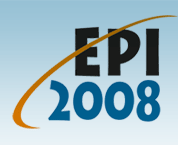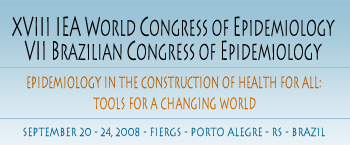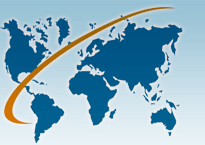Welcome Note
Welcome to Porto Alegre, Brazil and the XVIII
IEA World Congress of Epidemiology in 2008!
Epidemiology in Brazil is young
and enthusiastic. Its style of practice in this large Latin America country
has unique features. As a key arm of ABRASCO, the Brazilian Association
of Collective Health, epidemiology is committed to the public’s
health and to the construction of a strong national health system offering
universal coverage. As the organizers of the Brazilian Congress of Epidemiology
in 2008, we extend a warm invitation to the IEA and its members to join
us, placing its 2008 encounter within this vibrant Brazilian context.
Porto Alegre
Porto Alegre, our venue, is an attractive site for a successful
international meeting. Though perhaps lacking a bit of the hustle and
bustle of larger Brazilian cities, Porto Alegre, with its million and
a half inhabitants, is a modern metropolis. Capital of Brazil’s
southernmost state, its population reflects the mixture of German and
Italian immigrants of the 1800s with earlier immigrants from the Azores
and the gauchos, descents of the region’s Portuguese, Spanish, indigenous
and African settlers.
The city’s features can charm its visitors. The sun setting over
the Guaíba estuary; its parks and tree-lined streets, its multicultural
scenario, including a rich gastronomy reflecting its many pasts, and the
gaucho hospitality are just a few of its attractions. With the FIERGS
convention center, a modern facility with capacity to hold meetings of
over 5000 participants, Porto Alegre has attracted many national and international
events over the last 15 years, including four encounters of the World
Social Forum.
Our Theme
Our
theme: Epidemiology in the Construction of Health
for All: Tools for a Changing World will highlight the following
issues:
Construction:
Epidemiology is one of several disciplines, and epidemiologists one of
several categories of social actors involved in improving population health.
The word construction emphasizes the key role of epidemiology,
a discipline which integrates those around it, in this multi- and trans-disciplinarity
task.
Health
for All: In reemphasizing this now traditional motto,
we highlight epidemiology’s role at national and local levels in
developing, maintaining and renovating systems offering health care to
whole populations. Within this context, issues related to equity and to
inclusion of disadvantaged population groups are essential. The recent
Brazilian experience with a universal health system will be highlighted.
Tools:
Epidemiology is largely about tools for studying disease frequency, for
establishing exposure-disease relationships, for testing health interventions
and for evaluating health systems. The idea of tools also extends to the
construction and evaluation of preventive and curative health services,
so as to permit health workers at all levels to provide evidence-based
care.
Changing World:
The Congress will highlight the many changes occurring in the early 21st
Century: demographic and epidemiological transitions; environmental alterations;
the growth in research capacity for addressing health problems around
the world; and the widening gap in health status between the rich and
poor found both between and within nations and accompanied by a global
divide in access to the benefits of scientific progress.
Possible topics are:.
- Collaboration between epidemiology and other
research disciplines
- Epidemiologists and policy-makers: how to
work together
- Access to scientific information
- Epidemiology and the Millennium Development
Goals
- Epidemiology and primary health care
- International and intra-national inequalities
in health
- What can other countries learn from the successes
and failures of the Brazilian experience?
- Epidemiology in health systems and policy
research
- Epidemiology in the development, implementation
and evaluation of clinical and public health guidelines
- Epidemiological methods for decentralized
health management
- Translation of research findings into practice
- Health promotion, disease prevention and surveillance
for non-communicable diseases
- New paradigms for disease causation: from
the molecule to the population
- Life course epidemiology
- Global trends in health and in its determinants
- New exposures and new diseases
- Terrorism and violence: threats to public
health
- The eminence of new pandemics
- Environmental change and public health
- Managing noncommunicable diseases in low and
middle-income countries
|



